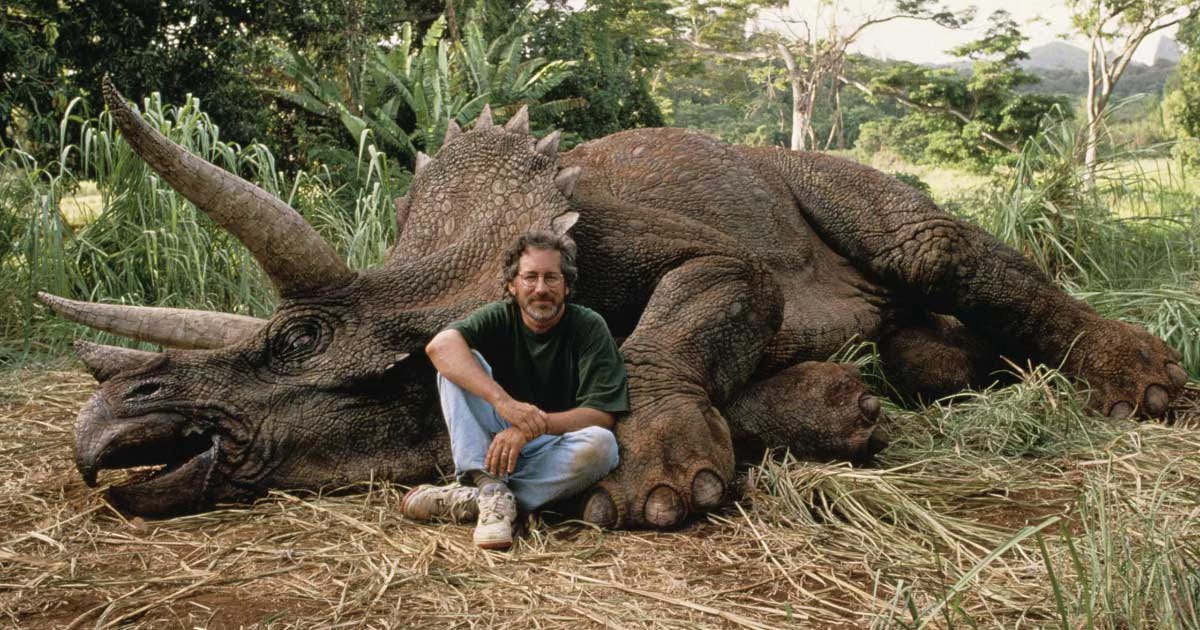“Because the movie delivers on the bottom line, I’m giving it three stars. You want great dinosaurs, you got great dinosaurs.”
-Roger Ebert
In Steve Brusatte’s non-fiction book The Rise and Fall of the Dinosaurs, the self-described Jurassic Park fanatic discusses the ways that Spielberg and co. failed the reality of the T. rex. Brusatte writes that while a Tyrannasaur could indeed run quite fast, adults couldn’t move as quickly as their young. Therefore, an adult wouldn’t be able to speed up enough to match the horsepower of a Jeep like it does as it trails Ian Malcolm and Ellie Sattler in Spielberg’s film. Nor did a lack of movement from prey visually impair the great beast’s hunt for flesh, as Alan Grant repeatedly instructs his fellow park-goers when the Rex is near: “Don’t move. It can’t see us if we don’t move.”
These patent falsities can’t entirely be attributed to a lack of diligence on the filmmakers’ part. As Brusatte notes, a lot of what we now know about dinosaurs has been naturally accumulative knowledge spanning decades of ongoing research. Scientists and paleontologists like Brusatte are in a constant state of discovery and refinement, of unlearning old theories and unearthing new ones as technology improves and findings are made. At the time of Jurassic Park’s release, the meteor as the cause for the dino-extinction was still a nascent theory and more than a decade out from being cemented as fact. And, of course, there’s the most infamous revelation about dinosaurs, that T. Rex and many other dinosaur species were likely peppered in little tufts of feathery fluff, some eventually developing feathers. In the end, the fictional Alan Grant was not just vindicated, he was surpassed: Birds aren’t just descended from dinosaurs, birds are dinosaurs.
Like Brusatte, I’m kinda crazy about dinosaurs—though not enough that I wanted to stake my career in them. I have dinosaurs on my phone case, a dinosaur plush on my bed, I own two children’s XL shirts covered in dinosaurs and dinosaur fact; like Brusatte, Jurassic Park was a childhood staple. I read Brusatte’s dinosaur book earlier this year, a couple years since first tackling his follow-up, The Rise and Reign of the Mammals. Both books helped to reinvigorate my fascination with extinct creatures to heights surpassing that of my youth. As a kid, dinosaurs are just monsters. As an adult, they are monsters come to life in a world that once was but will never be again.
Jurassic Park is a work of fiction, but it left at least one child, Brusatte, with such a staggering impression that they sought a life devoted to its subject matter. Perhaps it’s because the film’s foundational material is based in fact, even if those facts are somewhat altered, bent, or have been otherwise discredited since the film’s release and by the very progeny it inspired. Yet in spite of what Spielberg gets wrong or right, his film crucially spends the first 15-20 minutes ruminating on history. The dinosaur DNA encased within fossilized mosquitoes, the work of paleontologists at a dig site. From the jump, we understand that these creatures are not just movie monsters—their bones, their remnants of life, are still in our earth.
Roger Ebert gave Jurassic Park a mixed positive review back in 1993, writing that it lacked “a sense of awe and wonderment,” “grandeur,” or “strong human story values.”1 The last bit carries at least a nugget of truth—the story is simplified from Michael Crichton’s original novel. The characters are familiar archetypes, nestled within ideas about mankind’s arrogant disposition towards playing God and how nature will always seek vengeance.
But Ebert’s opinion that the film lacks “a sense of awe and wonderment” is—I’ll say it—stupid and wrong, and to a puzzling degree. When John Williams’ theme swells as the Brachiosaur hoists on its hind legs in front of Grant and Sattler; when the newly freed T. rex bellows into the night through its hybridization of baby elephant, alligator, and tiger’s roar, as thunderstorm rain clatters onto its shadowy, animatronic head, Spielberg’s reverence for these grand beasts pulsates like a beating heart. Say what you will about what Spielberg did to Hollywood, say what you will about a literal theme park film’s contribution to theme-parkifying the blockbusters of decades to come. 30 years since Jurassic Park dominated the box office, the bottom line is this: The film still looks incredible, still feels incredible, is kinda the reason why we go to the movies in the first place. If Jurassic Park gave way to a graveyard, it was certainly a happy death.
Keep reading with a 7-day free trial
Subscribe to Brianna's Digest to keep reading this post and get 7 days of free access to the full post archives.




